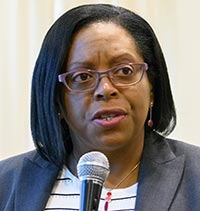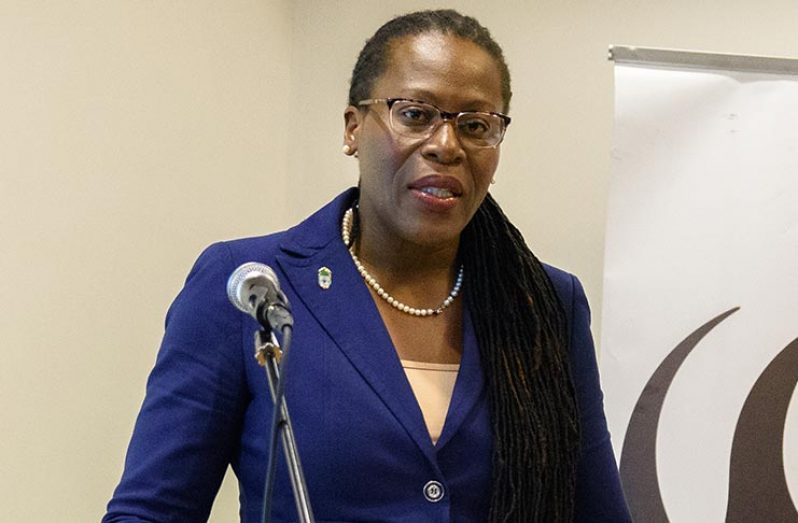— public consultations to be intensified
THE Department of Environment will be intensifying public consultations on the Green State Development Strategy (GSDS) in an effort to meet its revised deadline – September 2018.
Initially, the draft for the national development plan was expected to be completed this month (June 2018), but a new deadline has been set for submission to Cabinet.

The strategy is intended to provide a foundation for an inclusive green economy and simultaneously guide Guyana’s socio-cultural development.
At a recent GSDS Media Engagement at the Herdmanston Lodge hosted by the Department of Environment in collaboration with the World Wildlife Fund (WWF)-Guianas and Conservation International (CI) Guyana, WWF-Guianas Country Manager Aiesha Williams said extensive consultations have been conducted in coastal regions, and as such, during this last leg of consultation – spanning a period of two months – major focus will be placed on the hinterland Regions – One, Two, Seven, Eight, Nine and 10.
The consultations are being complemented by green conversations on the importance of an inclusive green economy.
Aside from the public consultations and conversations, there are seven expert groups focusing on the seven thematic areas the strategy is expected to cover. These thematic areas are Green and Inclusive Structural Transformation; Sustainable Management of Natural Resources and Expansion of Environmental Services; Energy; Resilient Infrastructure and Spatial Development; Human Development and Well-being; Governance and Institutional Pillars; and International Cooperation, Trade and Investment.
Director of the Department of Environment, Ndibi Schwiers, said while Guyana has an abundance of natural resources, it has not been able to maximise those resources in efficient and effective manner to reach its full potential.
“The Green State Development Strategy is a step in the right direction as it represents the vision and the expression of the ambition of the people of this country for a prosperous future in a sustainable environment,” Schwiers said, while warning against continued reliance on the country’s traditional sectors.
THE THREE DIMENSIONS
She noted that the strategy, when completed, will offer an approach to development based on the principles of the Green Economy, which focuses on the three dimensions of sustainable development – improving human well-being and social equity; reduction in environmental risks; and economic development.
The framework of the Green State Development Strategy is providing guidance for elaboration of the key sectoral and thematic priorities of the strategy. Notably, the framework is aligned to the 2030 Agenda for Sustainable Development, serving as a tripod platform for economic, social and environmental safeguards. These safeguards, during development of the GSDS, are to ensure a sustainable and fair transition to inclusive green growth and a better quality of life for all Guyanese.
“In parallel with the on-going nationwide consultations, three economic modelling assessments are being undertaken in the areas of – green economy policy, just transition and decent work conditions and green industry,” the director of the Department of Environment further explained.
Schwiers said the media have a key role to play in the dissemination of information on the strategy and its development.
“We recognise your role as an important stakeholder group to inform, educate, enlighten and facilitate civil discourses that are essential to this process and to Guyanese society as a whole,” she told media operatives present.
Weighing in on the strategy, Project Manager of the GSDS Coordination Office, Deirdre Shurland said it is expected to focus, in addition to other key sectors, on energy and infrastructure. However, she said Guyana would not be truly transformed and development if major emphasis is not placed on people.
“A big part of the Green State Development Strategy is about human development and well-being, and making sure that over the two decades, which is the horizon of the GSDS that we reduced the current disparities that exist between the coastal regions of Guyana and the hinterland regions of Guyana, that we provide equitable benefits accessible to Guyanese populations,” Shurland explained.
Meanwhile, CI Vice-President, Dr. David Singh said CI, which has a strong history of working with Indigenous communities as well as policy-makers, is working along with the Ministry of Indigenous Peoples’ Affairs to complete the Sustainable Villages Policy.
The Regional Democratic Council (RDC) of Region Nine is also benefitting from CI’s expertise in the development of a Regional Development Plan in line with the principles of the GSDS.












